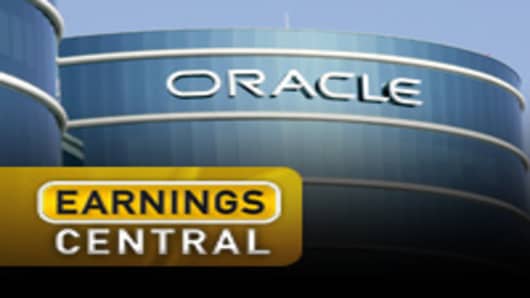I wrote earlier about "timing" and how it related to Oracleand its scheduled report of its first quarter earnings.
What a rockin' day on Wall Street. Turns out, reporting pretty good news on a day when the Dow scampers 400 points and the Nasdaq recovers 100 points, translates into fantastic timing for Oracle shareholders.
Oracle shares enjoyed a nice pop as soon as its earnings hit the tape. We'll see if it can hold as we await guidance from the company which will come on its conference call later this afternoon.
The company beats Wall Street on the bottom-line by 2 cents, reporting 29 cents a share in profits versus the 27 cents expected. That news came on inline revenue of $5.4 billion. New license revenue grew at 14 percent, exactly what many on the Street anticipated. But when you look at the EPS number, it's pretty striking. EPS grew 32 percent during the first quarter, compared to the 27 percent Oracle posted last year. Also, Oracle reports 40 percent in non-GAAP operating margins, which is its best first quarter performance ever.
Oracle is a strange situation, and hardly what it seems on the surface. To call this company merely a software firm with a narrow focus on the enterprise misses the true strength of what Oracle has to offer. Mainly diversification. The fact is, Oracle is a key player in three main buckets of the software business, including applications, database and middleware products. And thanks to the $40 billion this company has spent over the past four years, Oracle deals with only a few competitors.
- Oracle Tops Profit Forecasts; Shares Rise
Sure, Oracle's business is slowing, but let's not forget that better than 50 percent of its business comes from maintenance fees on the stuff it's already sold. Citi's Brent Thill tells me that software is so mission critical to the customers using it that even in an economic downturn they'd be reluctant to stop servicing the software they're already using.
They may not buy new, but that's irrelevant to the Oracle model where ongoing maintenance fees are its bread and butter. That's why heading into today's earnings, even with the issues facing the company, he maintains a "buy" and $25 target.



